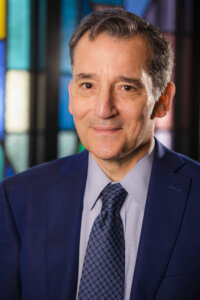Pro-Palestinian groups gather at Harvard University to show their support at a rally in Cambridge, Massachusetts, on October 14, 2023. Photo by Getty Images
Rabbi David Wolpe, a harsh critic of Harvard’s handling of antisemitism on campus following the Oct. 7 Hamas attack on Israel, said Tuesday that it is “reasonable” for the Trump administration to review the federal government’s $9 billion investment in the school but that the grants should not be used “as a blunt instrument” or “to suppress genuine free speech.”
Wolpe, the emeritus rabbi of Sinai Temple in Los Angeles, spent the 2023-2024 academic year as a visiting scholar at Harvard, and served briefly on an antisemitism task force appointed as a response to accusations that pro-Palestinian activism was making Jews on campus unsafe.
He resigned from that group after a few weeks, and his most recent stint at Harvard ended not with fanfare but with frustration. “It was pretty clear when I was there that there were a lot of people in influential positions that were not happy at my presence,” Wolpe said in a telephone interview on Tuesday. “People in the Divinity School in particular were, for the most part, very out of sync with the way I looked at the world.”
The Trump administration’s review of Harvard’s funding follows its withdrawal of $400 million in federal grants and contracts from Columbia University, which is now negotiating changes to how it handles antisemitism and other issues in hopes of restoring the money.
Harvard, whose $52 billion endowment is the largest of any university in the world, has more than $8.7 billion in multiyear federal grants and another $255 million in active contracts, according to a statement from the Departments of Education, Health and Human Services, and the U.S. General Services Administration.
In a letter to the Harvard community Monday night, the school’s interim president, Alan Garber — who is Jewish — described antisemitism as “one of the most insidious forms of bigotry” and pledged to confront it. But he warned that cutting off federal funds to the school and its affiliated hospitals would “halt life-saving research.”
Wolpe said he sees the federal pressure campaign as a double-edged sword — one that can prompt action but risks unintended consequences. “These kinds of threats and reviews are successful in galvanizing sluggish administrations,” he said. “And I hope that if it is done, it’s done carefully and not haphazardly, because a lot of important and good work goes on at Harvard.”
He cautioned that the political motivations behind the review could hold its own peril for American Jews. “It is undeniable that Jews are unwittingly in the crosshairs of various political fights right now,” he said. “Our job is to continue to advocate for Jews in a nonpartisan way.”
That advocacy, Wolpe said, includes defending free speech — even speech some may find offensive. “I still believe deeply in academic freedom,” he said. “And I hope that it is possible to have it, and also to have the kind of red lines against antisemitism that we do against racism, misogyny and any other prejudice.”
Asked whether all anti-Zionist rhetoric should be considered antisemitic, Wolpe demurred, saying: “No, that’s too easy.” But, he added, “there’s a large overlap in that Venn diagram.”
International student deportations

The review of elite university’s federal funding has come alongside the Trump administration’s efforts to deport international students involved in pro-Palestinian demonstrations, something Wolpe is unequivocally against.
“I’m deeply opposed to deporting someone for their views, as opposed to for genuine violations of law,” he said. “Because arbitrary use of power can switch direction at any moment. I mean, we know that from our history — this is not new to Jews.”
Though he left Harvard when his one-year fellowship ended last June, Wolpe said he has stayed in touch with former colleagues there, and still participates in its Council on Academic Freedom, a group of current and former faculty members formed in April 2023. He said that his students had submitted a petition to the administration asking that his appointment be extended, and that he “never heard a word from the administration about that petition.”
Would he return if asked? “A Harvard that would want me back would be a different Harvard,” he said. “And so I would consider going back to a Harvard that would want someone like me to be back.”

I hope you appreciated this article. Before you go, I’d like to ask you to please support the Forward.
At a time when other newsrooms are closing or cutting back, the Forward has removed its paywall and invested additional resources to report on the ground from Israel and around the U.S. on the impact of the war, rising antisemitism and polarized discourse.
Readers like you make it all possible. We’ve started our Passover Fundraising Drive, and we need 1,800 readers like you to step up to support the Forward by April 21. Members of the Forward board are even matching the first 1,000 gifts, up to $70,000.
This is a great time to support independent Jewish journalism, because every dollar goes twice as far.
— Rachel Fishman Feddersen, Publisher and CEO

